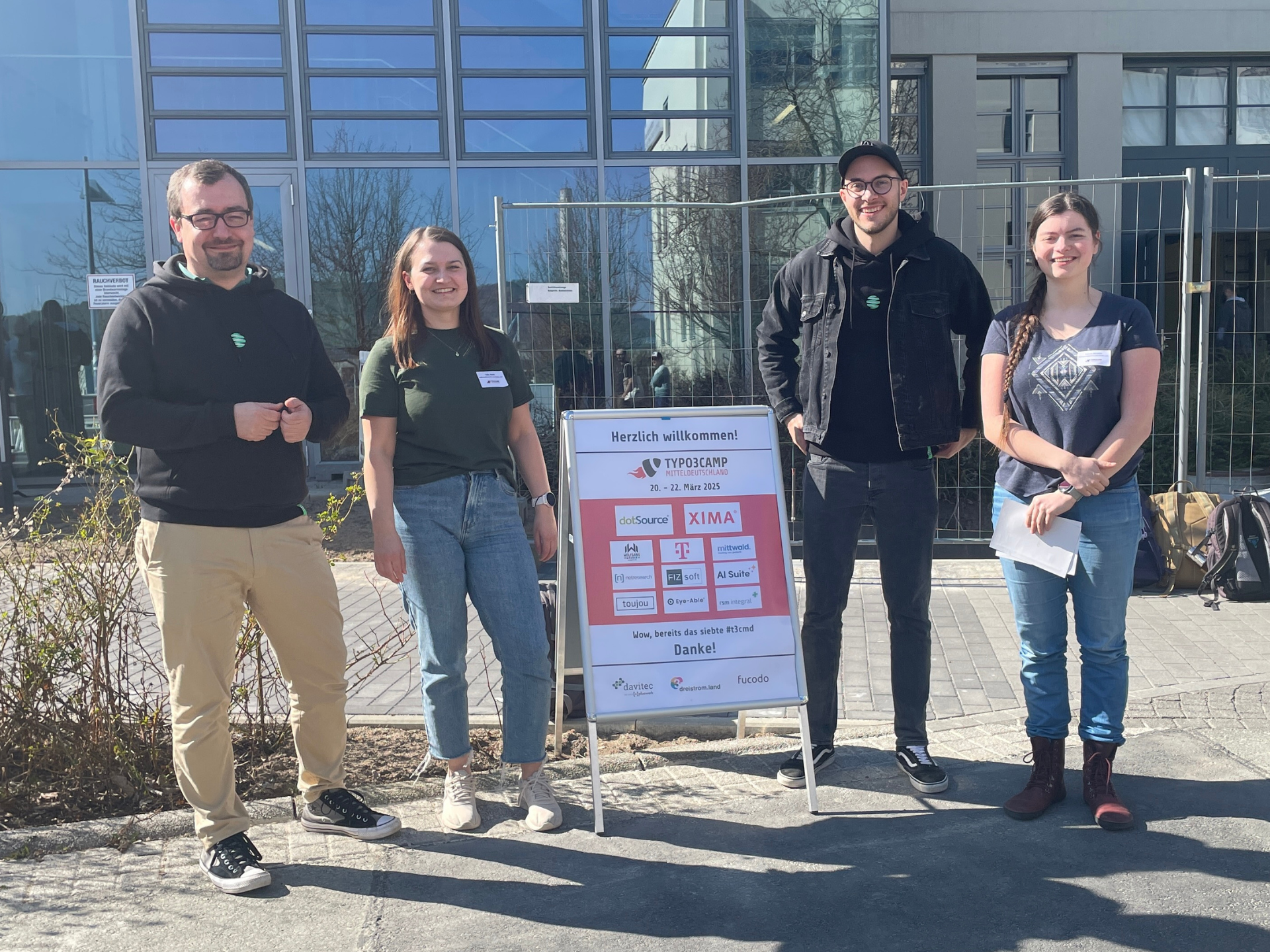TYPO3 Camp Mitteldeutschland 2025

Recap
TYPO3 Camp Mitteldeutschland 2025
The TYPO3 Camp Mitteldeutschland is an excellent opportunity for mutual updating and exchanging, eagerly awaited by the local TYPO3 community every year. For 2025, the organizing team came up with two innovations: After a long series of events in Dresden, the event took place in Jena, Thuringia this time and started for the first time with a user day specifically aimed at customers and editors. We were numerous on site and present here our highlights from areas such as accessibility, AI, and cyber security.
Certifications & Cyber Security
The first day brought 4 good news right away, as the usual certification round at TYPO3 Camps revealed: Two of us can now proudly call themselves TYPO3 Editor and TYPO3 Developer, and we are looking forward to incorporating this boost of know-how into the next projects!
For the user day, we would like to mention the presentation by Ralf Zimmermann from dreistrom.land and Carlos Meyer from davitec. Ralf provided an overview of recent IT security vulnerabilities that have attracted attention. He explained that not everyone is always in the crosshairs of a hacker attack, even though it may feel that way. Often, one is only targeted in order to reach the actual target person. His advice: do not use biometric features such as TouchID and FaceID, as they are quickly spread all over the internet and a fingerprint can be reconstructed quickly from photos of fingers, for example. Furthermore, companies should regularly professionally train their staff, as only in this way will paying attention to security become a habit.
In his part of the presentation, Carlos talked about typical security challenges with TYPO3 and presented best practices for dealing with them. We would like to highlight the role-based access control, where each person has only the minimum rights necessary to perform their tasks.
Accessibility: by people for people
Against the background of soon-to-be-enforced legal regulations, the topic of digital accessibility should of course not be missing at an event like the TYPO3 Camp Mitteldeutschland. In this regard, there were two exciting presentations on the automated testing of websites according to accessibility criteria.
The first one was called "Manual Testing - Because Humans are not Machines" and already in the title expressed the conclusion that the use of a testing tool alone is not sufficient. Criteria such as high-contrast effects and the meaningfulness of alternative texts are currently not 100% machine-testable and require a careful look from trained individuals.
In the second presentation, the testing software Eye-Able Audit was introduced, which guides a person through a guided test and thus ensures compliance with criteria that cannot be tested automatically. The application also features an integrated AI assistant that answers questions about accessibility, offers solution suggestions, and generates alternative text for images. Currently, a widget is also being planned to directly integrate Eye-Able into TYPO3.
We highly appreciate the developer's distinction from the overlay tool Eye-Able Assist. This is merely a tool for users of a website who are less technically savvy and do not know how to, for example, change font sizes in their browser. We agree with the statement that "Eye-Able Assist alone cannot make a website accessible," as we are frequently confronted with such questions in our agency work.
TYPO3 Extensions
The community is constantly working on expanding the pool of features and tools for TYPO3 to make working with the open source CMS easier and more efficient. Events like the TYPO3 Camp Mitteldeutschland are also always used to present the latest extensions and provide tips for developing them. Here are our thematic highlights:
Rico Schlüppel, Managing Director at the IT service provider Davitec, presented the prototype of a chat assistant for the TYPO3 backend, designed to assist in content creation. Within this tool, target groups, tone, formatting, and other prompts can be reused at any time after initial configuration to quickly produce consistent results. Additionally, a traffic light system has been implemented to highlight specific pages in the backend that still need revision from the AI's perspective, for example, if the content does not yet match the target audience - a plus in terms of efficiency for editors. In contrast to the TYPO3 AI Suite, which offers system-wide AI integration, this extension focuses solely on content creation, making it suitable for users who want to concentrate solely on that aspect.
Konrad Michalik from the XIMA agency presented Content Planner, an extension for documenting editorial progress, for example during the manual migration of content. With the extension, a predefined status can be assigned to each page, which is prominently highlighted in color for easy visibility. Additionally, Content Planner allows assigning pages to specific users, adding comments to them, and tracking the overall editing progress of all pages through dashboard widgets. From our perspective, Content Planner is a very useful tool for organizing editorial work, both during a relaunch and in ongoing operations.
The webits gained an interesting project insight in the presentation by Patrick Broens, who has implemented numerous websites for Dutch municipalities. For this purpose, a large architecture was created with a single TYPO3 Core that contains a large pool of components, from which municipalities can choose according to the requirements of their website. The components can be visually customized as desired, avoiding a template-like impression, and allowing each municipality to emphasize its identity through its own design. Patrick and his team have developed about 100 custom TYPO3 extensions for the entire architecture, so that in the worst case scenario, they would not be blocked if an external extension falls behind in development.
Overall, the approach offers the advantage that no dependency conflicts arise between different components and a high consistency can be ensured across many pages. Additionally, it is easy to update the entire system and implement a new TYPO3 version. Patrick mentioned the very high complexity as a disadvantage, which slows down working on the codebase because a large amount of data always needs to be loaded. As is often the case, this solution also comes with its own set of problems that need to be individually evaluated.
Our TYPO3 Camp Mitteldeutschland 2025

We experienced a very well-attended camp with full sessions and friendly speakers. It is always nice to see how the spark jumps when speakers have fun on stage and feel passion for their topic. Presented in this way, content also stays better in the minds of the audience.
We particularly enjoyed the User Day this year. A format that also appeals to customers and individuals who primarily use TYPO3 editorially is a valuable addition to the camp. Because in the end, the TYPO3 community consists not only of developers, but of everyone who uses the open source CMS and advances it in their own way.
We are very excited about the next TYPO3 Camp Mitteldeutschland and will definitely be there again!
Share this post